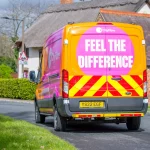Home » UK ISP News Archive » Daily Archives: April 30, 2025 (6 Posts Found)
Sponsored Links
You are viewing a April 30, 2025 news and article archive where older items are stored for readers to access and view. This is done to keep the systems running smoothly and prevents the front page from becoming too cluttered.
Search ISP News
Search ISP Listings
Search ISP Reviews
ISP News Archives for April 30, 2025
30th Apr 2025 (3 Comments)
Customers of banking and money management app Revolut, which last year launched a limited eSIM based mobile service for roaming travellers (here), has today revealed that they intend to go further by launching a full domestic mobile service for UK consumers with unlimited calls, texts, and data (mobile broadband) at home.
30th Apr 2025 (8 Comments)
Over the past few days’, we’ve seen a succession of scaremongering newspaper articles, which appear to warn UK consumers that their wireless routers or broadband may “grind to a halt” during this week’s heatwave. The articles appear to have been triggered by some advice that Virgin Media issued, but the reality is that this week’s weather won’t cause any major broadband issues.
30th Apr 2025 (5 Comments)
Network benchmarking firm Opensignal has today published the result of a new study that analyses the performance of Mobile Network Operators (MNOs like EE, O2, Vodafone and Three UK) and then compares that with their many virtual operators (MVNOs like Sky Mobile, iD Mobile, Smarty etc.). Overall, the primary operators deliver faster data speeds than virtual providers.
Advertisement
30th Apr 2025 (0 Comments)
The CEO of ISP Zen Internet, Richard Tang, has today shared three recent interviews with the bosses of several alternative network providers, including B4RN (Tom Rigg), MS3 (Guy Miller) and Quickline (Sean Royce). Each provides a useful progress update on their efforts to deploy full fibre (FTTP) broadband across different parts of the UK.
30th Apr 2025 (0 Comments)
New research from Broadband Genie has analysed 348,000 internet speed tests across 1,302 locations in order to identify the top slowest and fastest UK locations for broadband. The slowest location was found to be Lostwithiel in Cornwall (average downloads of 2Mbps and uploads of 1Mbps), while the fastest was South Hetton in County Durham (526Mbps down and 448Mbps up).
30th Apr 2025 (0 Comments)
Network analyst firm Streetwave, which is using bin lorries to help map the coverage and performance of 4G and 5G mobile (broadband) networks across 113 UK councils, has revealed how much the £1bn Shared Rural Network (SRN) project has helped to improve mobile coverage across mid-Wales over the past 9 months – O2 saw the strongest improvement.
Cheapest Big ISPs for 100Mbps+
Community Fibre £19.00
100Mbps (100Mbps up)
Vodafone £22.00
150Mbps (27 - 150Mbps up)
Virgin Media £23.99
264Mbps (25Mbps up)
Plusnet £24.99
145Mbps (30Mbps up)
Latest UK ISP News
Promotion
The Top 15 Category Tags
- FTTP (6842)
- BT (3900)
- Politics (3092)
- Business (2786)
- Openreach (2677)
- Building Digital UK (2522)
- Mobile Broadband (2494)
- FTTC (2147)
- Statistics (2143)
- 4G (2109)
- Virgin Media (2038)
- Ofcom Regulation (1787)
- 5G (1752)
- Fibre Optic (1608)
- Wireless Internet (1602)
New Forum Topics
By: The Wee Bear
By: mwarby
By: The Wee Bear
Promotion
Helpful ISP Guides and Tips
Latest Interviews
Sponsored
Copyright © 1999 to Present - ISPreview.co.uk - All Rights Reserved - Terms , Privacy and Cookie Policy , Links , Website Rules , Contact










































